


Smoky Quartz: Enter our Online Store of Smoky Quartz Jewelry
MINERALMINERS.COM®- Your Personal 'Link' Direct to the Smoky Quartz Mines!TM
See our other QUARTZ varieties: AGATE , AMETHYST, AMETRINE, Blue AVENTURINE,
Green AVENTURINE, CAT'S-EYE QUARTZ, CHRYSOPRASE, CITRINE, SKELETAL QUARTZ (elestial quartz crystal),
JASPER, PHANTOM QUARTZ, ROCK CRYSTAL, ROSE QUARTZ and RUTILATED QUARTZ
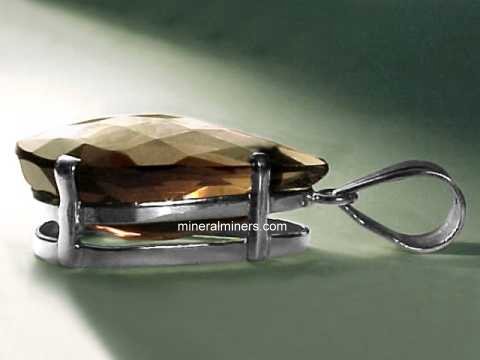
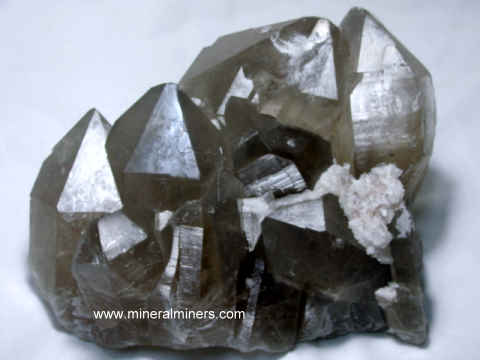
Smoky Quartz Mineral Information Topics:
Smoky Quartz Products in our On-line Store
Smoky Quartz Physical Properties
Smoky Quartz Background Information
Smoky Quartz Occurance and Diagnostic Features
Smoky Quartz History, Uses and Lore (cairngorm)
Smoky Quartz Metaphysical Properties
See the Smoky Quartz Information Index
- Smoky Quartz chemical composition: SiO2
- Class: tectosilicate
- Smoky Quartz Crystal system: Hexagonal-Rhombohedral; 32 (trigonal-trapezohedral)
- Crystal habit: Macroscopic smoky quartz crystals commonly occur as
horizontally striated hexagonal prisms terminated by a combination of
positive and negative rhombohedrons forming six sided pyramids. Prism
faces and/or rhombohedral terminations may be lacking, poorly developed
or predominant resulting in diverse possible crystal habits. Trigonal
tapezohedral faces can occur in the upper right or left of alternating
prism faces identifying right or left handed smoky quartz crystals, respectively.
- Twinning: Dauphine twin with c the twin axis, Brazil
twin with {1120} the twin plane, Japanese twin is rare with {1122} the twin plane.
- Smoky Quartz Specific gravity: 2.65
- Index of refraction: 1.54-1.55
- Birefringence: maximum of 0.009
- Smoky Quartz Pleochroism: distinct
- Hardness: 7
- Smoky Quartz Color: brown to gray to black
- Luster: vitreous
- Transparency: transparent
- Cleavage: none
- Smoky Quartz Fracture: conchoidal
- Streak: white
See the Smoky Quartz Information Index
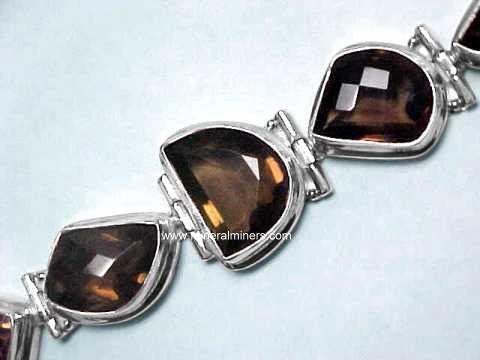
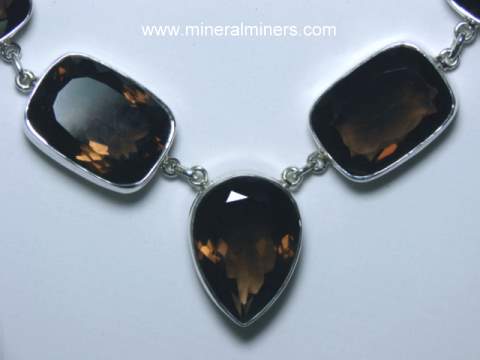
Smoky quartz is a macrocrystalline
variety of the mineral Quartz (SiO2).
Quartz is the most abundant single mineral on earth.
It makes up about 12% of the earth's crust, occurring in a wide variety
of igneous, metamorphic and sedimentary rocks.
Quartz varieties are commonly separated into two groups based on the
size of the individual grains or crystals;
macrocrystalline quartz in which individual crystals are distinguishable with the naked eye,
and cryptocrystalline quartz in which the individual crystals are too small to be easily distinguishable under the
light microscope.
Some of the macrocrystalline quartz varieties are: amethyst crystals, ametrine, cat's-eye quartz, citrine crystals, phantom quartz crystals, colorless quartz crystals, rose quartz, rutilated quartz crystals, and smoky quartz crystals.
Blue Aventurine Quartz and Green Aventurine Quartz
are actually quartzites (a rock, not a mineral) composed essentially of interlocking
macrocrystalline quartz grains with disseminated grains of other color imparting minerals.
The cryptocrystalline varieties of quartz may be separated into two types;
fibrous and microgranular. Chalcedony is the general term
applied to the fibrous cryptocrystalline varieties.
Agate is an example of a fibrous cryptocystalline
banded chalcedony variety of quartz. Carnelian, Chrysoprase and bloodstone
are other chalcedony varieties.
Chert is the general term applied to the granular cryptocrystalline
varieties of quartz, of which flint and Jasper are examples.
See the Smoky Quartz Information Index
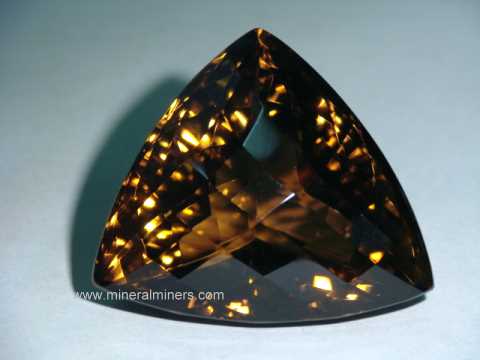
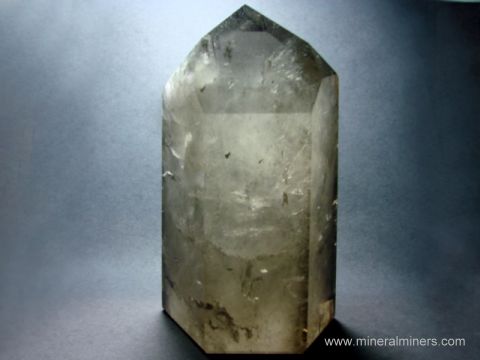
Smoky quartz is transparent quartz that is brown, gray or black. It
commonly occurs in quartz
veins where it crytallizes inside rock cavities known as vugs. Rutile is sometimes found in these smoky quartz veins forming rutilated smoky quartz.
Smoky quartz also is common in vugs or pockets in granitic pegmatites associated with the feldspar varieties
microline and albite, and it is less frequently found together with some of the more rare pegmatite minerals such as lepdiolite & amblygonite. Smoky quartz occurs occasionally together with some of the rare pegmatite gem varietie such as
aquamarine, kunzite, and toumaline. Smoky
quartz can occur as secondary quartz crystals on cryptocrystalline
quartz in cavities and vugs forming geodes.
The characteristic color of smoky quartz occurs in nature when rock
crystal quartz is exposed to natural radiation
from radioactive elements or adjacent radioactive rocks over long periods
of time. The process by which this occurs is not completely understood,
although it is known that exposure of transparent quartz to radiation
can alter the oxidation states of impurities in the quartz
structure resulting in the characteristic colors of smoky quartz. Subsequent
heating reverses this process.
Rock crystal specimens are synthetically irradiated to smoky quartz for
commercial purposes.
Smoky quartz often has minute cavity inclusions containing carbon dioxide or
water. If there is a sufficient number of these minute fluid inclusions
then the quartz becomes opaque and is called milky quartz.
Most smoky quartz forms on a matrix of milky quartz and crystals of smoky
quartz often grade into milky quartz towards their base.
Smoky quartz often has cavities
containing both liguid and gas phases known as a two-phase inclusions or quartz enhydros.
In rare cases, two-phase inclusions in quartz can be visible to the unaided
eye and may show actual movement of the gas phase within the liquid phase.
Smoky quartz sometimes forms with an etched pattern of lines,
depressions and raised terminations. If these etched terminations are accompanied
by plainly visible internal
cavities arranged in
geometric patterns related to the quartz crystal structure, the form is
referred to as skeletal quartz or elestial quartz which are more popularly known as elestial quartz crystals.
The internal cavities of skeletal quartz often contain clay minerals
of varied colors, sometimes accompanied by
carbon dioxide or water. These cavities can have a layered or ribbed aspect
and are sometimes so pronounced as to make the crystal almost hollow,
giving rise to the term skeletal quartz.
Occaisionally these cavities
contain both liguid and gas phases together known as two-phase inclusions.
In rare cases, these two-phase inclusions in skeletal quartz may show actual
movement of the gas phase within the liquid phase
(popularly known as elestial smoky quartz enhydros).
Other minerals can form as inclusions within smoky quartz. Some of
the more important varieties of included smoky quartz for gem use are
rutilated quartz and black tourmaline in quartz.
Some other
common mineral inclusions in smoky quartz are chlorite,
goethite and hematite.
Phantom quartz shapes are sometimes present in
the interior of smoky quartz crystals, showing an earlier growth stage of the smoky quartz crystal. The phantom shapes within these phantom quartz crystals are usually composed of other
minerals such as chlorite or of other varieties of quartz such as milky quartz,
colorless rock crystal, or smoky quartz of lighter or darker shades
which form on most or all of the surfaces of the quartz crystal at a
particular point in time during its growth,
after which the quartz crystal resumes its crystallization enclosing the
phantom crystal outline within itself.
Smoky quartz is recognized by its crystal habit, transparency, hardness, glassy luster,
color, conchoidal fracture, occurance and general lack of cleavage.
See the Smoky Quartz Information Index
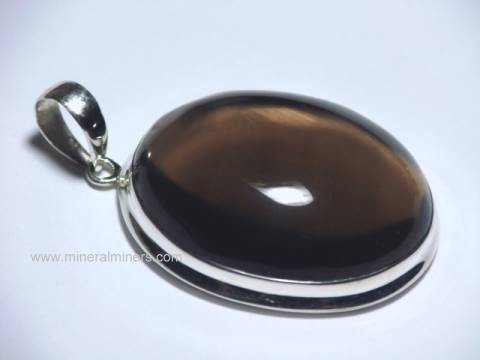
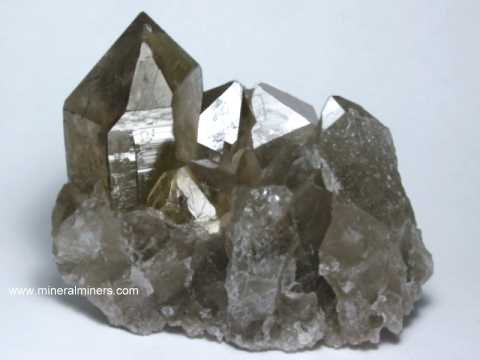
Pliny wrote nearly 2000 years ago that quartz crystals formed from ice
exposed to intense cold for long periods of time in dark clefts and caverns in the
mountains. This general
belief was popular in diverse cultures until the eighteenth century, when
modern geology began to develope in Europe.
Smoky quartz has been used as gemstones and other
ornamental and religous objects for thousands of years.
The very dark brown to black smoky quartz is sometimes called morion.
Faceted brown smoky quartz has been called smoky topaz.
Smoky quartz
is also known as cairngorm or as cairngorm crystal, or cairngorm stone, named after an old
locality in the Cairngorm Mountains in the Scottish Highlands where it was traditionally used as an ornamental stone in the handles of daggers and knives, in the tops of snuff boxes, and in Highland brooch designs and other smoky quartz jewelry items.
The name quartz comes from the Saxon word querklufterz which meant
cross vein ore.
The astrological signs of smoky quartz are Capricorn and Sagitarius.
We specialize in real smoky quartz crystals - unheated & untreated, just as they were found inside the earth! Some of our natural smoky quartz crystals have gem-grade areas inside. Have you seen our selection of real smoky quartz gemstones? Each one was handcrafted from a flawless area inside one of our natural smoky quartz crystals! We are offering these genuine smoky quartz gems as loose stones, and also set into handcrafted jewelry items. Be sure to see the natural smoky quartz gems set in our real smoky quartz jewelry!
See the Smoky Quartz Information Index
Wearing an item of genuine smoky quartz jewelry is said to alleviate stress and transform fear, anger and
other negative emotions into positive energies, thus having a comforting
and calming effect. It is also said to provide clarity of thought, improve
intuition and enhance survival instincts, and to stimulate higher awareness
in meditative states.
Smoky quartz is said to increase fertility, to help remove
toxins from the body, and to aid the proper functioning of the kidneys,
adrenals, pancreas and sex organs.
For more in-depth metaphysical information, see our Metaphysical Books section.
This is the end of our Smoky Quartz Information page.
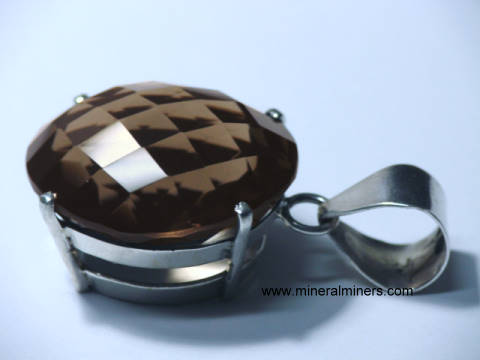
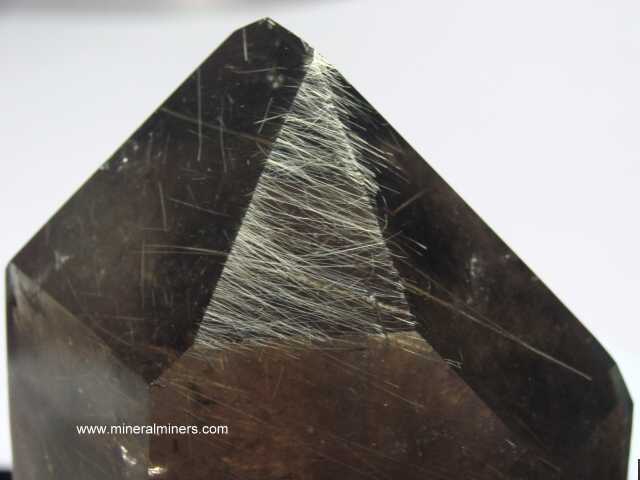 Last Updated: September 25, 2024
Last Updated: September 25, 2024
© Copyright 1998-2024 Gem & Mineral Miners, Inc.® All Rights Reserved.












